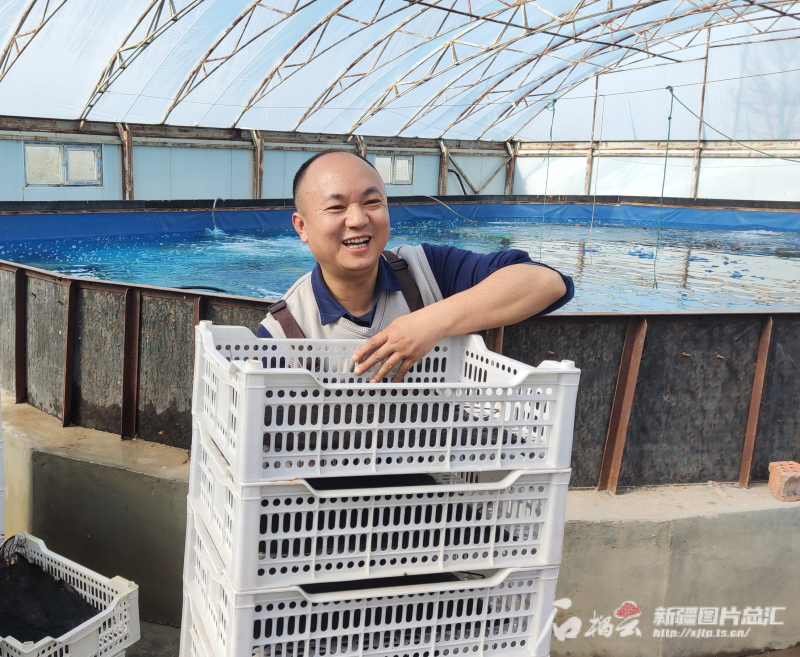Shiliuyun-Xinjiang Daily (Reporter Liu Yiming) news: Hu Jianyong has been engaged in fish farming in Xinjiang, a region far from the ocean, for 17 years. After graduating from Xinjiang Agricultural University in 2007, he joined the Aquatic Science Research Institute of Xinjiang Uygur Autonomous Region. His goal was to conduct research on aquaculture and promote successful fish farming models among the local population. Now, he has realized his dream.

Photo taken on April 15, 2024 shows Hu Jianyong working, including conducting artificial breeding of zander and making artificial fish nests at the scientific research and demonstration base of the Aquatic Science Research Institute of Xinjiang Uygur Autonomous Region. (Photo by Jiao Fei)
Hu Jianyong, who majored in animal husbandry during his postgraduate studies, made a career shift when he chose to enter the field of aquaculture. Starting with the most basic tasks, he needed to inspect the ponds late at night and promptly switch on aerators during the high-temperature seasons to prevent the fish from lacking of oxygen. Due to the unique conditions of aquatic life, medication methods, and growth patterns, professionals in the aquaculture industry often face extreme weather and remote work environments. Hu Jianyong overcame these challenges and quickly adapted to life at the fish farming base.
To improve his fish farming skills, Hu Jianyong carefully studied the key operations of fish breeding and gained practical experience. Through this hands-on approach, he gradually became a key contributor to the technological development of scientific research and demonstration base. He also initiated independent experimental demonstrations and technical research.
Hu’s work aimed to meet the technological requirements of advanced models and key species while promoting green development, transforming the old aquaculture model, and improving production efficiency. Faced with the technological challenges of developing indigenous economic fish species in Xinjiang, Hu Jianyong proposed a systematic and comprehensive approach to researching and developing advantageous and unique fish resources. He and his team made key technological breakthroughs in unique economic fish species such as bass and zander, obtaining multiple patented achievements in areas such as artificial breeding and domestication.
To address the technological shortcomings in the treatment of aquaculture tail water, Hu Jianyong and his team actively sought knowledge in the developed aquaculture regions in China and conducted over 10 specialized investigations throughout Xinjiang. They analyzed the core issues and took into account Xinjiang's unique climate conditions and aquaculture methods.
Based on their findings, they initiated research on ecological management technology that combined planting with breeding. Their work provided feasible solutions for establishing water ecological treatment methods in Xinjiang and for utilizing resources more effectively.
To address the environmental challenges associated with grass carp aquaculture in southern Xinjiang, Hu Jianyong and his team embarked on a new research initiative. They established two ecological aquaculture models and promoted their adoption in the region. These models have contributed to the sustainable development of the grass carp aquaculture industry in southern Xinjiang.
“Grass carp is one of the most common freshwater farmed fish in China. We guide local farmers to plant alfalfa by the pond, use pond water for irrigation, and feed alfalfa to the grass carp raised in the pond, which not only reduces the amount of artificial feed needed but also lowers the cost of farming,” said Hu Jianyong. According to Him, feeding grass carp with those plants can help the grass carp grow stronger, reduce the occurrence of diseases, and enhances the taste.
With the advancement of eco-friendly development in the aquaculture industry in 2020, Hu Jianyong and his team have promoted over 333 hectares of eco-farming models such as aquaponics, pond-based recirculating aquaculture systems, and land-based recirculating aquaculture. They also applied ecological aquaculture tailwater treatment techniques, reaching a promotion area of over 2,000 hectares.
In addition, the team introduced over 300 million new species and established 10 demonstration bases throughout the region. These bases covered a demonstration area of nearly 4,000 hectares and achieved a total output value of 623 million yuan (about 85.98 million U.S. dollars). The adoption of these sustainable practices resulted in an additional output value of 73 million yuan (about 10.74 million U.S. dollars).
Hu Jianyong has been recognized for his outstanding contributions. He was selected for the "Tianshan Excellent Youth" talent development program and awarded the "Medal for Individual Participating in the Development and Construction of Xinjiang." He was also named one of the most beautiful fisheries technicians in China. Under his leadership, the Hu Jianyong Innovation Studio was established. He has led and participated in over 20 scientific research and promotion projects at the provincial or ministerial level, producing multiple research results.
"For me, the way to satisfy myself is to focus on what I do best," says Hu Jianyong. He and his team have set higher goals for the future. They will continue to strengthen their research on green ecological aquaculture technologies and models for the treatment of aquaculture tailwater ecological, and they will focus on serving the green and high-quality development of the fishery industry in Xinjiang.
(A written permission shall be obtained for reprinting, excerpting, copying and mirroring of the contents published on this website. Unauthorized aforementioned act shall be deemed an infringement, of which the actor shall be held accountable under the law.)









